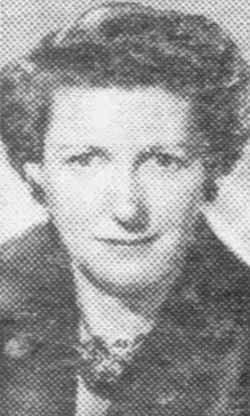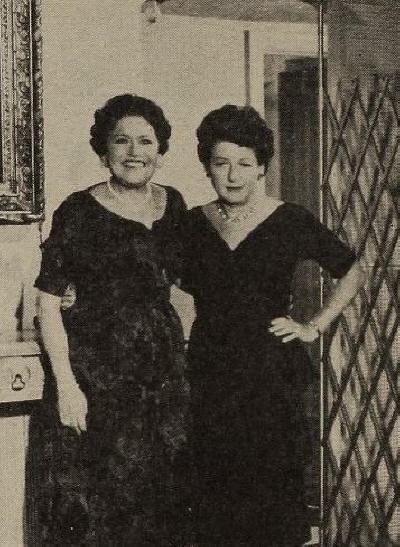

Husband King Kennedy, Partner Lynn Bowers, Evelyn Farney
Queer Places:
Wellesley College (Seven Sisters), 106 Central St, Wellesley, MA 02481
Holy Cross Cemetery
Culver City, Los Angeles County, California, USA
 Harriet
Oettinger Parsons (August 23, 1906 - January 2, 1983) was an American film
producer, actress, director, and magazine writer; one of the few female
producers in the United States at the time. Her mother was famed gossip
columnist Louella Parsons. Louella Parsons’ gay sidekick
King Kennedy would marry her
lesbian daughter
Harriet Parsons in 1939, even if
they hardly ever lived together. Hedda
Hopper employed a lesbian woman,
Dema Harshbarger, as manager
and general personal assistant. When Kennedy left Parsons, he joined Hopper.
Later, Robert Shaw also worked for her. According to him, she often used gay
men as informants.
Harriet
Oettinger Parsons (August 23, 1906 - January 2, 1983) was an American film
producer, actress, director, and magazine writer; one of the few female
producers in the United States at the time. Her mother was famed gossip
columnist Louella Parsons. Louella Parsons’ gay sidekick
King Kennedy would marry her
lesbian daughter
Harriet Parsons in 1939, even if
they hardly ever lived together. Hedda
Hopper employed a lesbian woman,
Dema Harshbarger, as manager
and general personal assistant. When Kennedy left Parsons, he joined Hopper.
Later, Robert Shaw also worked for her. According to him, she often used gay
men as informants.
Harriet was born in 1906 in Burlington, Iowa, the daughter of Louella Parsons and her first husband, John Dement Parsons.[1] She appeared as "Baby Parsons" in several movies, which included The Magic Wand (1912), written by her mother.[2] Harriet attended Wellesley College, graduating around 1929.[1]
She began working as writer for Metro-Goldwyn Mayer in 1928 but left after a year to become a columnist and associate editor for Photoplay as well as writing for other magazines such as Liberty.[2][3] She left to write for Hearst's International News Service and Universal Service in 1931 and worked there until 1933, when she went to work for Columbia Pictures as a producer.[2] She wrote for The Los Angeles Examiner from 1935 through 1943; had a syndicated column for Hearst from 1938–1940 (Hollywood in Review); and had her own weekly radio show on NBC in 1938, Hollywood Highlights.
In 1933, she began working for Columbia Pictures producing their Screen Snapshots documentary shorts and in 1940 she moved to Republic Pictures, directing and producing a series of documentary shorts called Meet the Stars, in which she commented on the goings-on of Hollywood A-listers.[2][4][5] She produced her first feature film, Joan of Ozark, in 1942 and was then hired by RKO as a feature film producer in 1943.[2][6] When Howard Hughes took over, Parsons was one of the only producers he kept on.[7] She worked at RKO for 12 years, although the experience was a frustrating one: The studio often reassigned stories she'd chosen to other producers.[8]

Louella Parsons and her daughter Harriet Parsons, 1959
She began development of Arthur Wing Pinero's fantasy "The Enchanted Cottage," only to have it wrestled from her and given to Dudley Nichols. Ironically, it was Louella Parsons' rival, Hedda Hopper, who came to Harriet's defense, charging RKO in her column with a "dirty deal." The picture was summarily returned to Harriet, and her career shifted into high gear. The Enchanted Cottage (1945) is a moving, tender fable of a homely woman and a disfigured man who, within the magic walls of the cottage, find themselves transformed. Parson's collaboration with her hand-chosen writer was significant. She'd known the brilliant, sensitive, homosexual DeWitt Bodeen for years; she knew he'd be perfect for The Enchanted Cottage. Together, as Bodeen recalled, they recrafted the play in their own fashion. "What I had to rebuild," he wrote, "was a modern romance that would be credible, omit all the sentimentality and rely upon the plausibility of love between a plain and unwanted spinster and a bitter crippled soldier, each of whom sought to hide away from a world that had rejected them." Harriet clearly wanted DeWitt because they shared "something sympathique."
"They were very good, lifelong friends, extraordinarily devoted to each other," remembered the writer Charles Higham, who knew Bodeen. With DeWitt, Harriet felt a trust and camaraderie neither found in many other areas of Hollywood.
She was one of only three female producers active in the United States from 1943 to 1955 (the others being Virginia Van Upp and Joan Harrison).[3] Parsons bought a home in the Deep Well neighborhood of Palm Springs, California in 1955.[9] From 1956 to 1957 she worked for 20th Century Fox Television.[2] She also co-produced Benn Levy's play Rape of the Belt on Broadway in November 1960.[2][10]
In 1931, she and actor Edward Woods announced their engagement; it was broken off by 1932.[1][11] She married actor and playwright King Kennedy in September 1939; the marriage, she'd later admit, was orchestrated by her mother. The couple separated in 1944.[12][13] Parsons sued him for divorce in March 1945, citing cruelty.[14] By the 1950s she was living with publicist Lynn Bowers. She was a co-founder (with her mother) of the Hollywood Women's Press Club and was a director and member of the entertainment committee member of the Hollywood Canteen during World War II.[2]
After Bowers, Harriet was involved with a well-known actress-singer; they were viewed as a couple by many within the industry.
She had other important successes, notably I Remember Mama (1948), also written by Bodeen, and Clash by Night (1952), one of the most powerful of Barbara Stanwyck's later films.
She settled down in Palm Spings with a companion, Evelyn Farney, a former dancer whom she also legally adopted. She left RKO in 1956, tried her hand at Broadway. She produced one play, "The Rape of the Belt," which flopped, and then got involved in real estate.
Her memoirs were written with a "feminist, career-oriented slant," she said in 1982, some months before her death. They were never published; one friend recalled that they were quite "explosive" and that her former lover, the singer, had begged her not to go ahead with it.
Parsons died in 1983 at the age of 76 after suffering from cancer for two years. She was interred at the Holy Cross Cemetery, Culver City, California.[15] She was survived by her daughter, Evelyn.[16]
My published books: